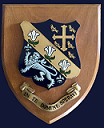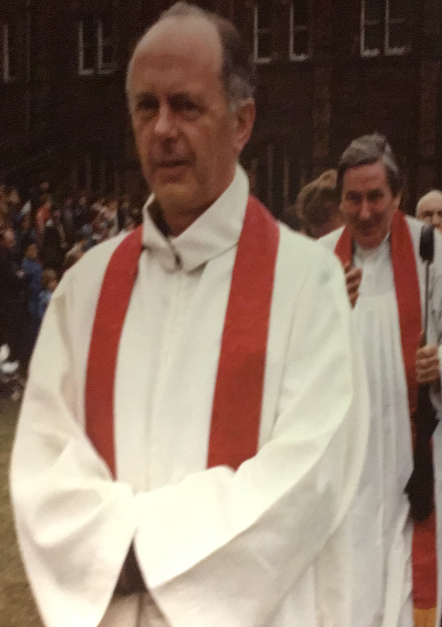
St Joseph's Society


I entered Upholland in Grammar as a 13 year old from St Mary’s College, Crosby, and some of my classmates were Gerard Lee, Tom Dakin, Bernard Doyle, Anthony (“Jimmy”) Howe, Joe Bamber and Peter Morris. Mgr. Joe Dean was the Rector.
It was wartime. At home, I remembered the May Blitz of 1940, and my father, a civil servant in the Ministry of Labour, worked very near to St Luke’s Church (‘the bombed out church’) in Liverpool, and had been on duty as a fire watcher the night of the bombing, when Lewis’s and Blacklers Department Stores were also hit.
Upholland College in 1941 was in wartime mode. There were blackout requirements and all windows needed to be covered. The high lights of the chapel couldn’t be used, for example, and instead, lamps were used over the benches for the liturgy and prayer life to continue uninterrupted. The Maundy Thursday Mass for the Blessing of Holy Oils was transferred from the Pro-Cathedral to the College where sufficient clerics could easily be mustered. The later Rector, Mgr. Turner, was once commissioned to consecrate portable altar stones, little bigger than a tile, to be used by military chaplains. Tables carrying them filled the main aisle of the chapel and it made a wonderful blaze when each stone had small wax crosses lit on it during the ceremony – it lasted for ages!
From the dormitories at the top of the building, I remember after lights out, the shutters could be removed and the windows opened, and occasionally, you could see an orange glow in the night sky. Liverpool was under attack.
Young men of 18+ years were liable to conscription as the War progressed, and while tonsured clerics were exempt and did not need to register, young men from Rhetoric were required to ‘do their bit’. So, Joe Mercer, two years ahead of me, went to War, and ashore with the D-Day Landings. When he came back four years later, he was two years behind me. Jimmy Dunne was one of several students who went into the coal mines as a Bevin Boy, and the list could go on and on…
Although exempt from National Service, some of the staff volunteered as military chaplains. Fr Frank Kieran, who taught me mathematics, joined the Army, and Fr Matty Grace, the RAF.
Despite some students being conscripted and some clerics enlisting, there was an atmosphere outside the College when able bodied students were seen in groups walking around the locality, which led to some resentment; while other families’ young men were serving their country, these students were not!
Britain in wartime moved to double summer time with extra light at night. For the War effort, and to be seen to be contributing, whole classes were put to working on the College farm. Seasonally, there was potato picking and ‘fashing’ (lopping the tops off) turnips, and also, more enjoyably, hay making. But mucking out the shippens (cow stalls and sheds) was all year round, and to remove the smell from yourself and your clothes required lots and lots of carbolic soap!
For an experimental period the cows were put out to graze on the grass in the sports field – but cows did what cows do naturally, and the pitches had to be inspected before each game to make them fit for purpose; not always with total success!
Harry Hall, the barber, came to the College at regular intervals and featured in the pantomime as “the tonsorial artist.” He was even given a line in a song “the busy scissors whiz bristles off the rind” (try singing that at speed), though in truth his favoured tool was the clippers, and we ended up shorn like inmates of a concentration camp.
The College in wartime was also home to students from the Beda College in Rome, under their Rector, Mgr. Charles Duchemin, Prot. Ap., together with their staff. Their student make-up was different from ours. Some were former Anglican clergy, others no longer fit for military service. One, Gordon Wheeler, would later become Bishop of the Leeds diocese. The most memorable member in our days was Con Kelly, a former heavyweight boxing champion. They had their own lifestyle: their own professors, chapel, classrooms, common room and separate section in the refectory.
To accommodate these students on their four year course, our Philosophy students were moved from their rooms (the top floor of the East Wing) into the top floor of the South Wing where the Gradwell Library had been housed. The books and bookcases had been moved into the large rooms over the Old Theatre, which later became the Lower Line Chapel. Life in the “shacks”, as the Phils’ impromptu quarters were known, because each carrel had a bookcase and curtain to screen it off, gained in luxury and community what it lost in privacy, for the South Wing was comparatively well heated, and as a relic of a scheme to convert some of it into guest rooms, had running hot water in each compartment (oh bliss!), and we were able to discuss problems in our studies without leaving our desks – but we also knew who snored!
There were some shared and collaborative endeavours between the two sets of students however, with joint production of plays, and I remember Macbeth, The Merchant of Venice and As You Like It, safe in the hands of Eric Barber, a Beda student, and previously professional theatrical producer in Edinburgh.
Towards the end of the War, Upholland also became home to a contingent of Polish Army seminarists who had seen enemy occupation of their country and battle at first hand. Despite language difficulties, they fitted in with us pretty well.
When I entered the Upper House in 1945, Philosophy lectures and examinations were in Latin. Does anyone remember “the November handicaps” grilling in the Old Theatre, when students’ names were picked out of a hat at random, to be questioned in their studies in front of the Rector and Prefect of Discipline, as well as their peers, who hoped they would not be the next victim!
The seminary diet was fairly spartan, and not simply during the war years. Breakfast at 7.45am was of porridge with syrup (“treck”), and lunch was at 1pm, with a main course and pudding. Teatime was at 4.45pm, of tea and dry bread, with supper at 7pm. I particularly remember Sunday evening suppers with Spam (x2), bread and butter. During the main meals there was reading, occasionally from an interesting book (e.g. “The Most Haunted House in Britain” – later shown to a fake – and “The Worst Journey in the World” – to the South Pole). Overall, the heavy, starchy intake led to boils for some, and constipation for others…but we survived.
Outdoor recreation was seen as important for physical health and wellbeing, and Tuesday and Thursday afternoons, free from study, as well as a free period after lunch on other days, were assigned for compulsory sport, or walks, or work on “the diggings” (the lower field opposite the East Wing) which was being drained and levelled with shovels and wheelbarrows, using railway lines and trucks acquired from some small coal mine locally. The student supervisor was “The Gaffer.”
After the War, all the students “called up” began to return, taking up their studies where they had left off, and some new students joined us also. Several returnees who had been sergeants tended to socialise together, smoking furiously in part of the common room known, at least for a time, as “The Sergeants’ Mess”.
The day the War in Europe ended (VE Day), there was wild rejoicing in the College, with three days off study. We hastily arranged concerts and one act plays, and I recall an impromptu rugby match, refereed by Alex Jones. At its conclusion, he found himself tossed into the lake, and boats from the lake, long unrepaired for lack of materials in wartime, then formed the basis of a glorious and celebratory bonfire!